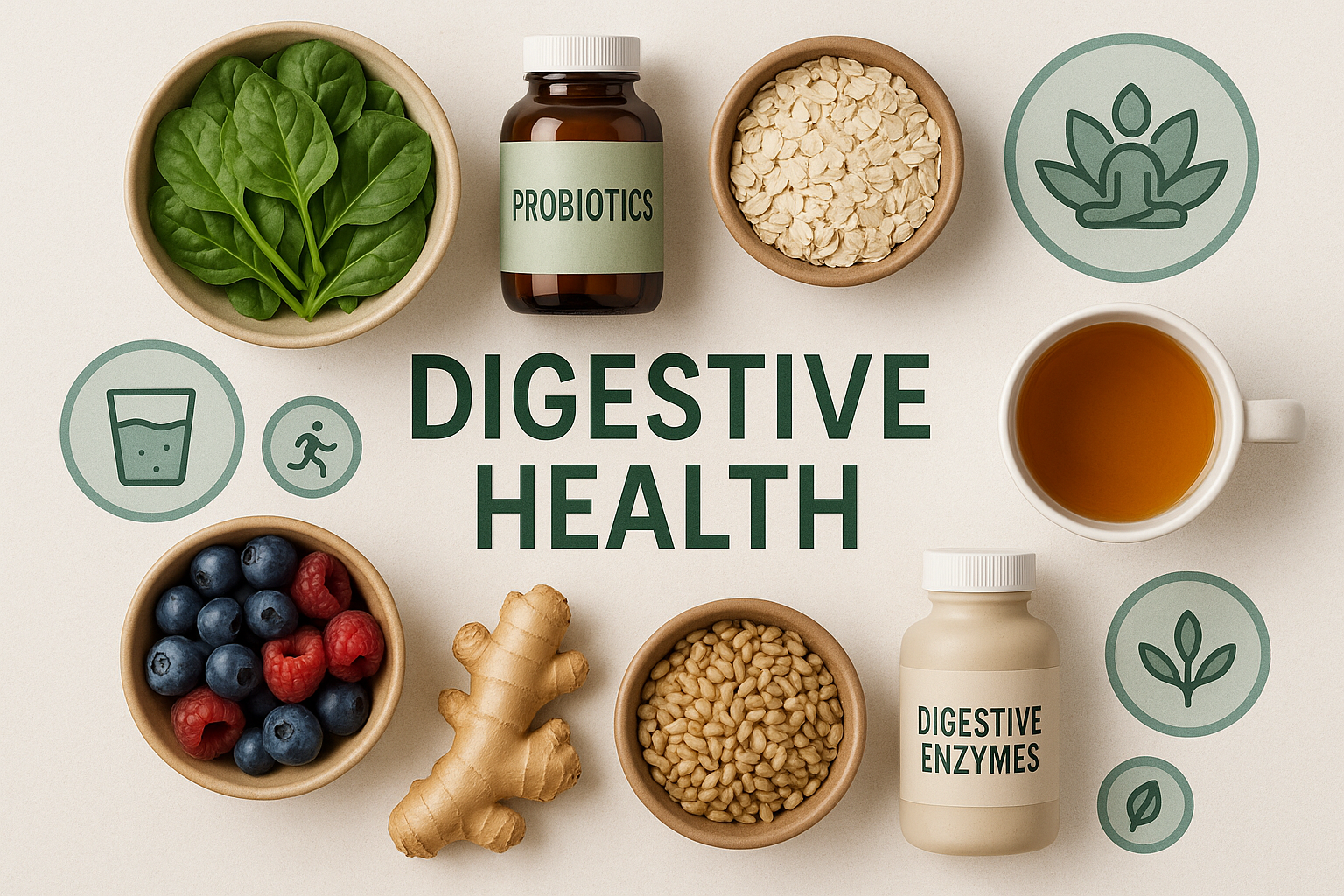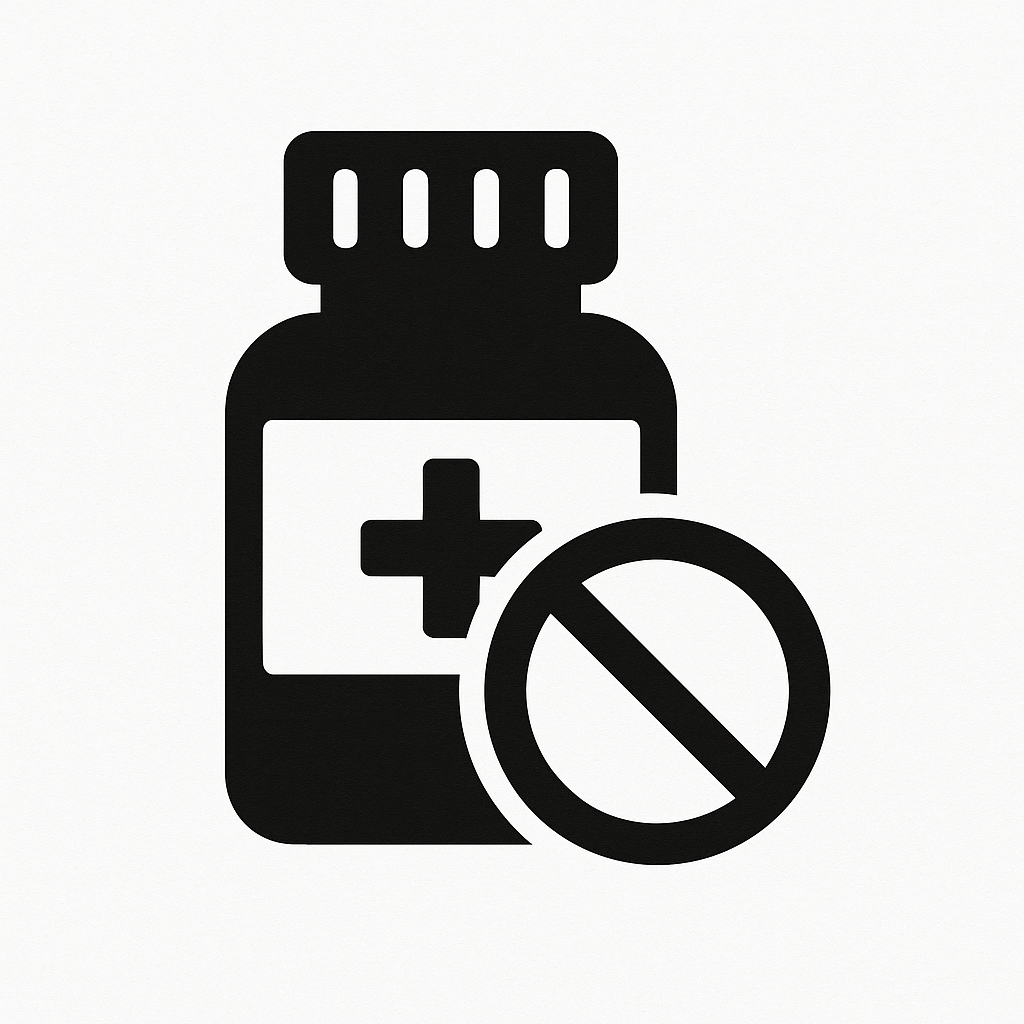
Digestive Health: Natural Supplements & Tips
Why Digestive Health Matters More Than You Think
The ancient Greek physician Hippocrates famously stated, "All disease begins in the gut." Modern science has validated this wisdom, revealing that digestive health extends far beyond simple food processing. Your gut is home to trillions of microorganisms that influence immunity, hormone production, neurotransmitter synthesis, and even mood regulation.
When your digestive system functions optimally, you experience sustained energy, mental clarity, strong immunity, healthy skin, and efficient nutrient absorption. Conversely, digestive dysfunction can manifest as bloating, gas, constipation, diarrhea, food sensitivities, brain fog, fatigue, skin issues, and weakened immune response.
The good news? Nature provides powerful tools to restore and maintain digestive wellness. Through strategic supplementation combined with lifestyle modifications, you can transform your gut health and experience the ripple effects throughout your entire body.
Understanding Your Digestive System: A Complex Ecosystem
Before diving into solutions, it's essential to understand what you're supporting. Your digestive system is a sophisticated network that includes:
The Gut Microbiome: Trillions of bacteria, fungi, and other microorganisms that aid digestion, produce vitamins, regulate immunity, and communicate with your brain via the gut-brain axis.
The Intestinal Barrier: A selective barrier that allows nutrients to pass while blocking pathogens and toxins. When compromised (often called "leaky gut"), it can trigger inflammation and immune reactions.
Digestive Enzymes: Proteins that break down food into absorbable nutrients. Production can decline with age, stress, or poor diet.
The Enteric Nervous System: Often called the "second brain," this network of neurons in your gut wall produces neurotransmitters and communicates bidirectionally with your brain.
Gut-Associated Lymphoid Tissue (GALT): Approximately 70% of your immune system resides in your gut, making digestive health inseparable from immune function.
Common Digestive Issues and Their Root Causes
Understanding the underlying causes of digestive problems is essential for addressing them effectively:
Dysbiosis: An imbalance in gut bacteria, often caused by antibiotics, poor diet, stress, or environmental toxins. This can lead to bloating, irregular bowel movements, and compromised immunity.
Low Stomach Acid: Contrary to popular belief, many digestive issues stem from insufficient stomach acid rather than excess. This impairs protein digestion and mineral absorption.
Enzyme Deficiency: Reduced production of digestive enzymes can result from aging, pancreatic dysfunction, or chronic stress, leading to undigested food particles and digestive discomfort.
Intestinal Permeability: When the gut lining becomes compromised, larger food particles and toxins can enter the bloodstream, triggering inflammation and food sensitivities.
Chronic Stress: The gut-brain connection means that chronic stress directly impacts digestive function by reducing blood flow to the digestive tract and altering gut motility.
Poor Diet: Excessive processed foods, sugar, and unhealthy fats feed harmful bacteria while starving beneficial microbes, creating a cycle of digestive dysfunction.
Essential Natural Supplements for Digestive Health
1. Probiotics: Replenishing Beneficial Bacteria
Probiotics are live beneficial bacteria that colonize your gut and support optimal digestive function. These microorganisms offer numerous benefits:
Benefits: Restore microbial balance after antibiotic use, reduce bloating and gas, support regular bowel movements, enhance immune function, improve nutrient absorption, and reduce inflammation.
Key Strains: Look for multi-strain formulas containing Lactobacillus acidophilus, Lactobacillus rhamnosus, Bifidobacterium lactis, and Bifidobacterium longum. Different strains offer different benefits, so diversity matters.
Dosage: A therapeutic dose typically ranges from 10-50 billion CFU (colony-forming units) daily. Start lower and gradually increase to assess tolerance.
Best Practices: Take probiotics on an empty stomach or with a small amount of food. Refrigerated formulas often contain more viable organisms, though shelf-stable options with protective technology also work well.
2. Digestive Enzymes: Optimizing Nutrient Breakdown
Digestive enzymes help break down proteins, fats, and carbohydrates into absorbable nutrients, reducing digestive burden and discomfort.
Benefits: Reduce bloating and gas after meals, improve nutrient absorption, decrease food sensitivities, support protein digestion, and reduce digestive fatigue.
Key Enzymes:
- Protease: Breaks down proteins into amino acids
- Lipase: Digests fats into fatty acids
- Amylase: Converts carbohydrates into simple sugars
- Lactase: Digests lactose for those with dairy sensitivity
- Cellulase: Breaks down plant fibers
Usage: Take digestive enzymes at the beginning of meals for optimal effectiveness. Choose broad-spectrum formulas that address all macronutrients.
3. L-Glutamine: Healing the Gut Lining
L-Glutamine is an amino acid that serves as primary fuel for intestinal cells, making it crucial for maintaining and repairing the gut barrier.
Benefits: Repairs intestinal permeability ("leaky gut"), reduces inflammation, supports immune function, enhances nutrient absorption, and protects against stress-induced gut damage.
Dosage: Typical therapeutic doses range from 5-15 grams daily, often split into multiple doses. Start with 5 grams and increase gradually.
Best Practices: Take on an empty stomach for optimal absorption. Powder form mixed in water is often most effective.
4. Fiber Supplements: Supporting Regularity and Microbiome Health
Dietary fiber feeds beneficial gut bacteria and supports healthy bowel movements, yet most people consume far less than the recommended 25-35 grams daily.
Soluble Fiber: Dissolves in water to form a gel-like substance. Examples include psyllium husk, inulin, and acacia fiber. These feed beneficial bacteria and support cholesterol management.
Insoluble Fiber: Adds bulk to stool and promotes regularity. Found in wheat bran, flax seeds, and vegetable fibers.
Benefits: Promotes regular bowel movements, feeds beneficial gut bacteria (prebiotic effect), supports healthy cholesterol levels, improves satiety, and stabilizes blood sugar.
Usage: Start with small amounts and gradually increase while drinking plenty of water to prevent digestive discomfort. Aim for a combination of soluble and insoluble fiber.
5. Ginger Extract: Natural Digestive Support
Ginger has been used for millennia to support digestive health and reduce nausea.
Benefits: Reduces nausea and vomiting, accelerates gastric emptying, reduces bloating, has anti-inflammatory properties, supports healthy gut motility, and may reduce symptoms of indigestion.
Dosage: 1-2 grams of ginger extract daily, or fresh ginger tea throughout the day.
Usage: Can be taken before meals to stimulate digestion or after meals to reduce discomfort.
6. Peppermint Oil: Soothing Digestive Discomfort
Enteric-coated peppermint oil has been shown to relax intestinal smooth muscle and reduce digestive spasms.
Benefits: Reduces symptoms of irritable bowel syndrome (IBS), alleviates bloating and gas, reduces abdominal pain, supports healthy gut motility, and has antimicrobial properties.
Dosage: 180-200mg of enteric-coated capsules taken 2-3 times daily between meals.
Note: Enteric coating is essential to prevent heartburn and ensure the oil reaches the intestines intact.
7. Apple Cider Vinegar: Supporting Stomach Acid
Raw, unfiltered apple cider vinegar may help support healthy stomach acid levels, particularly beneficial for those with hypochlorhydria (low stomach acid).
Benefits: May improve protein digestion, enhance mineral absorption, support healthy blood sugar response, provide beneficial enzymes and prebiotics, and reduce post-meal bloating.
Usage: 1-2 tablespoons diluted in water before meals. Capsule forms are also available for convenience.
8. Zinc Carnosine: Protecting the Gut Lining
This unique compound combines zinc with carnosine to provide targeted support for the gastric and intestinal lining.
Benefits: Protects and repairs the stomach lining, supports tight junction integrity in the intestines, has antioxidant properties, supports the gut barrier function, and may help with gastric ulcers.
Dosage: 75-150mg daily, typically taken between meals.
9. Aloe Vera: Soothing and Anti-inflammatory
Aloe vera has natural anti-inflammatory and gut-soothing properties.
Benefits: Reduces intestinal inflammation, supports healthy bowel movements, has prebiotic effects, soothes irritated gut lining, and supports hydration.
Usage: Look for decolorized, inner-leaf aloe vera juice or powder. Start with small amounts as it can have a mild laxative effect.
10. Marshmallow Root and Slippery Elm: Demulcent Support
These herbs contain mucilage that coats and soothes the digestive tract.
Benefits: Protects irritated gut lining, reduces inflammation, supports healing of ulcers and gastritis, soothes heartburn, and provides prebiotic fiber.
Usage: Can be taken as tea, powder, or capsules before meals to provide a protective coating.
Lifestyle Tips for Optimal Digestive Health
Supplements work best when combined with lifestyle practices that support digestive function:
1. Practice Mindful Eating
Chew Thoroughly: Aim for 20-30 chews per bite. Digestion begins in the mouth with salivary enzymes.
Eat in a Relaxed State: Activate your parasympathetic "rest and digest" nervous system by eating calmly without distractions.
Don't Overeat: Stop eating when you're 80% full to avoid overwhelming your digestive capacity.
2. Manage Stress Effectively
Chronic stress is one of the most significant disruptors of digestive health. Implement stress-reduction practices:
- Daily meditation or deep breathing exercises
- Regular physical activity
- Adequate sleep (7-9 hours nightly)
- Time in nature
- Boundaries around work and technology
3. Optimize Meal Timing
Don't Eat Too Late: Finish eating 2-3 hours before bed to allow proper digestion.
Consider Intermittent Fasting: Giving your digestive system extended rest periods can support gut healing and microbiome diversity.
Eat Regularly: Skipping meals can disrupt digestive rhythms and blood sugar balance.
4. Stay Hydrated
Adequate water intake supports mucus production in the intestines, helps fiber work effectively, and prevents constipation. Aim for half your body weight in ounces daily, adjusting for activity level.
5. Move Your Body
Regular physical activity stimulates intestinal contractions and supports healthy gut motility. Even a 15-minute walk after meals can improve digestion.
6. Prioritize Sleep
Poor sleep disrupts gut bacteria balance and increases intestinal permeability. Aim for consistent sleep-wake times and 7-9 hours of quality sleep nightly.
7. Limit Inflammatory Foods
Reduce or eliminate foods that commonly trigger digestive issues:
- Excessive alcohol
- Processed foods high in additives
- Trans fats and fried foods
- Excessive sugar
- Foods you're sensitive to (common culprits: gluten, dairy, soy)
8. Incorporate Fermented Foods
Natural fermented foods provide beneficial bacteria and enzymes:
- Sauerkraut
- Kimchi
- Kefir
- Kombucha
- Naturally fermented pickles
- Miso
- Tempeh
Start with small amounts and gradually increase to allow your system to adapt.
Building Your Personalized Digestive Health Protocol
Everyone's digestive system is unique, so a personalized approach works best:
Step 1: Identify Your Primary Issues Are you dealing with bloating, constipation, diarrhea, irregular movements, or food sensitivities? Understanding your main symptoms helps target the right solutions.
Step 2: Start with Foundations Begin with a quality probiotic and digestive enzymes, as these address the most common digestive issues.
Step 3: Add Targeted Support Based on your specific issues, add targeted supplements:
- For constipation: Increase fiber and magnesium
- For loose stools: Add L-glutamine and consider probiotics with specific strains
- For bloating: Try digestive enzymes, peppermint oil, and ginger
- For gut barrier issues: Focus on L-glutamine, zinc carnosine, and aloe vera
Step 4: Implement Lifestyle Changes Supplements enhance but don't replace healthy habits. Implement the lifestyle practices outlined above.
Step 5: Monitor and Adjust Keep a journal tracking your symptoms, supplements, diet, and stress levels. Adjust your protocol based on what works for your body.
Step 6: Be Patient and Consistent Gut healing takes time. Commit to your protocol for at least 8-12 weeks before expecting significant changes, though many people notice improvements within 2-4 weeks.
The Gut-Brain Connection: Mental Health and Digestion
The bidirectional communication between your gut and brain means that digestive health profoundly impacts mental wellbeing:
Neurotransmitter Production: Up to 90% of serotonin and 50% of dopamine are produced in the gut.
Vagus Nerve Communication: This major nerve highway sends signals between your gut and brain, influencing mood, anxiety, and stress response.
Inflammation and Mood: Gut inflammation can trigger systemic inflammation that affects brain function and mood regulation.
Supporting digestive health isn't just about physical comfort—it's an investment in mental and emotional wellbeing.
When to Seek Professional Help
While natural approaches work well for many digestive issues, certain symptoms warrant professional evaluation:
- Persistent or severe abdominal pain
- Blood in stool
- Unexplained weight loss
- Difficulty swallowing
- Persistent vomiting
- Symptoms that significantly impact quality of life
- No improvement after 8-12 weeks of consistent intervention
A functional medicine practitioner, gastroenterologist, or naturopathic doctor can provide comprehensive testing and personalized protocols for complex digestive issues.
Transform Your Digestive Health Today
Your digestive system is the foundation of whole-body health. By combining targeted natural supplements with supportive lifestyle practices, you can restore balance to this complex ecosystem and experience the profound benefits of optimal gut function.
The journey to digestive wellness isn't about perfection—it's about consistent, informed choices that support your body's innate healing capacity. Start with small, sustainable changes and build from there.
Take Action: Discover Premium Digestive Support Solutions
Ready to transform your digestive health with high-quality natural supplements? Don't compromise on the quality of products you trust with your gut health.
Visit Matevara's Gut Health & Digestive Support Collection to explore premium probiotics, digestive enzymes, gut-healing nutrients, and comprehensive formulas designed to restore digestive balance and optimize nutrient absorption. Each product is carefully selected for purity, potency, and effectiveness—because your gut health deserves nothing less.
Your journey to comfortable digestion, sustained energy, and vibrant health starts with one decision. Make it today.
Disclaimer: The information provided in this article is for educational and informational purposes only and is not intended as medical advice, diagnosis, or treatment. This content should not replace professional medical advice or be used to diagnose or treat health conditions. Always consult with a qualified healthcare provider before starting any new supplement regimen, especially if you have existing digestive conditions, are taking medications, are pregnant or nursing, or have food allergies. Individual results may vary, and the supplements discussed have not been evaluated by the FDA to diagnose, treat, cure, or prevent any disease. If you experience persistent or severe digestive symptoms, seek professional medical evaluation.
Share








